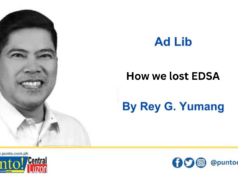EFFETE ELITISM did not die with the decapitated Louis XVI. It just reared its ugly head anew with that $20,000 lobster dinner in New York and that $15,000 steak supper in Washington, D.C. of the presidential party.
Feasting upon the sufferings of the people is a Bourbon tradition, best immortalized in the Marie Antoinette prescription to appease a hungry population: “Give them cakes.”
Of course, the Queen of France, like her husband, lost her head in the aftermath of the mother of all revolutions, the French Revolution.
Far removed from the head-cutting revolutionary upheavals through history’s various epochs – the Cuban edition of Fidel Castro and Che Guevara the last of the really great ones, and communism too hermitized in North Korea, the world has become one big bourgeois estate.
And like it or else, the bourgeoisie – to which our leaders belong – is all too different from us mere “people.” Here’s what I once wrote as “a bourgeois thesis.”
“AS REGARDS the people, they always will be stupid and barbarous. They are oxen which require a yoke, a goad and some hay.”
Damnation from some disdainful despot from the ancien regime? Hardly. That was Voltaire, whose very thoughts were among those that ignited the French Revolution, whose very name impacts of the Age of Reason.
The people are distinctively different from the People: the former are the masses or the general population, “rude, lacking in instruction, divorced from rational capacities as Mill wrote; the latter, those possessed of property, the faculties of ratiocination and culture.
They are the same People Jefferson wrote about in the Declaration of Independence as “…all men (are) created equal”, with the exclusion of the women, the slaves, the indentured servants, and native Indians – all who did not hold, by right, any property, or who themselves were deemed as mere property.
It is a historical given that ownership of property is a foundation of civilization. With the existence of civilization hinged on the continuity of private property, the need therefore for an authority to ensure its protection birthed government.
Thus, Aptheker’s fundamental assumption of political theory: “Governments existed for the purpose of preserving private property and that therefore, the governors were the propertied and the governed were the propertyless.”
Or, as John Jay, the first Chief Justice of the United States Supreme Court, succinctly puts it: “Those who own the country should govern it.”
Cry oligarchy!
An American scholar, F. Digby Baltzell, answers: “Granted, all complex societies – aristocratic, democratic or totalitarian – are oligarchical in that the few rule the many.”
Cry inequality!
French writer Benoist responds: “Inequality of value among men is a natural fact. And the practical consequence which spontaneously flows from it is this: Since inequality is a fact, equality ought not to be a right; since all men are not identical, all should not have the same powers as electors, No! Men are not equal to one another physically, morally, intellectually, or from any point of view of natural fact, and therefore they ought not to be so politically.”
The equality of all men in the body politic is but a manifest sophism that unfortunately became an accepted article of faith in a so-called democracy. So where has it led this country?
Self-government is the first pretension of democracy. In the individual man, wrote the English scholar Lilly, “self-government means the supremacy of the intellectual nature over the sensitive; the predominance of the moral over the animal self.”
Indeed, how can the people, “carried by every storm of passion, by every wind of impulse, by every gust of emotion”, then self-govern?
Aye, give the people the power to decide and they would “place preponderating political power in the unfittest hands.” See the jokes and blokes, the “master-idol of the delusory realm” running both Houses of Congress.
For, as Robert Michels wrote in 1915 yet: “The incompetence of the masses is almost universal throughout the domains of political life, and this constitutes the most solid foundation of the powers of the leaders.”
Some of Mill’s advocacies on governance find the greatest merit: only taxpayers can vote – for voting as a duty has the concomitant responsibility of paying taxes; an educational test for voting – a more stringent test for candidates, if I may add; all recipients of government aid barred from voting.
That is for the best. For only the “gifted Few” have the right to govern, with their “collective mediocrity” the people are mere objects of government. Nothing more.
SO, people like us, have to just grin and bear it, no, swallow our saliva along with whatever pride that remains in us, as we behold our glorious leaders feasting amid all our sufferings.
That is the great scheme of things, the destiny of the people.
Feasting upon the sufferings of the people is a Bourbon tradition, best immortalized in the Marie Antoinette prescription to appease a hungry population: “Give them cakes.”
Of course, the Queen of France, like her husband, lost her head in the aftermath of the mother of all revolutions, the French Revolution.
Far removed from the head-cutting revolutionary upheavals through history’s various epochs – the Cuban edition of Fidel Castro and Che Guevara the last of the really great ones, and communism too hermitized in North Korea, the world has become one big bourgeois estate.
And like it or else, the bourgeoisie – to which our leaders belong – is all too different from us mere “people.” Here’s what I once wrote as “a bourgeois thesis.”
“AS REGARDS the people, they always will be stupid and barbarous. They are oxen which require a yoke, a goad and some hay.”
Damnation from some disdainful despot from the ancien regime? Hardly. That was Voltaire, whose very thoughts were among those that ignited the French Revolution, whose very name impacts of the Age of Reason.
The people are distinctively different from the People: the former are the masses or the general population, “rude, lacking in instruction, divorced from rational capacities as Mill wrote; the latter, those possessed of property, the faculties of ratiocination and culture.
They are the same People Jefferson wrote about in the Declaration of Independence as “…all men (are) created equal”, with the exclusion of the women, the slaves, the indentured servants, and native Indians – all who did not hold, by right, any property, or who themselves were deemed as mere property.
It is a historical given that ownership of property is a foundation of civilization. With the existence of civilization hinged on the continuity of private property, the need therefore for an authority to ensure its protection birthed government.
Thus, Aptheker’s fundamental assumption of political theory: “Governments existed for the purpose of preserving private property and that therefore, the governors were the propertied and the governed were the propertyless.”
Or, as John Jay, the first Chief Justice of the United States Supreme Court, succinctly puts it: “Those who own the country should govern it.”
Cry oligarchy!
An American scholar, F. Digby Baltzell, answers: “Granted, all complex societies – aristocratic, democratic or totalitarian – are oligarchical in that the few rule the many.”
Cry inequality!
French writer Benoist responds: “Inequality of value among men is a natural fact. And the practical consequence which spontaneously flows from it is this: Since inequality is a fact, equality ought not to be a right; since all men are not identical, all should not have the same powers as electors, No! Men are not equal to one another physically, morally, intellectually, or from any point of view of natural fact, and therefore they ought not to be so politically.”
The equality of all men in the body politic is but a manifest sophism that unfortunately became an accepted article of faith in a so-called democracy. So where has it led this country?
Self-government is the first pretension of democracy. In the individual man, wrote the English scholar Lilly, “self-government means the supremacy of the intellectual nature over the sensitive; the predominance of the moral over the animal self.”
Indeed, how can the people, “carried by every storm of passion, by every wind of impulse, by every gust of emotion”, then self-govern?
Aye, give the people the power to decide and they would “place preponderating political power in the unfittest hands.” See the jokes and blokes, the “master-idol of the delusory realm” running both Houses of Congress.
For, as Robert Michels wrote in 1915 yet: “The incompetence of the masses is almost universal throughout the domains of political life, and this constitutes the most solid foundation of the powers of the leaders.”
Some of Mill’s advocacies on governance find the greatest merit: only taxpayers can vote – for voting as a duty has the concomitant responsibility of paying taxes; an educational test for voting – a more stringent test for candidates, if I may add; all recipients of government aid barred from voting.
That is for the best. For only the “gifted Few” have the right to govern, with their “collective mediocrity” the people are mere objects of government. Nothing more.
SO, people like us, have to just grin and bear it, no, swallow our saliva along with whatever pride that remains in us, as we behold our glorious leaders feasting amid all our sufferings.
That is the great scheme of things, the destiny of the people.




